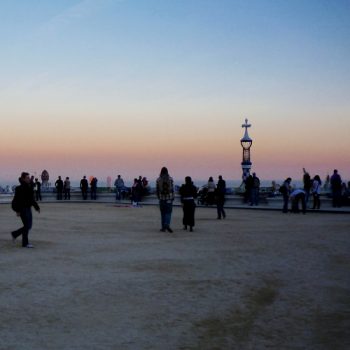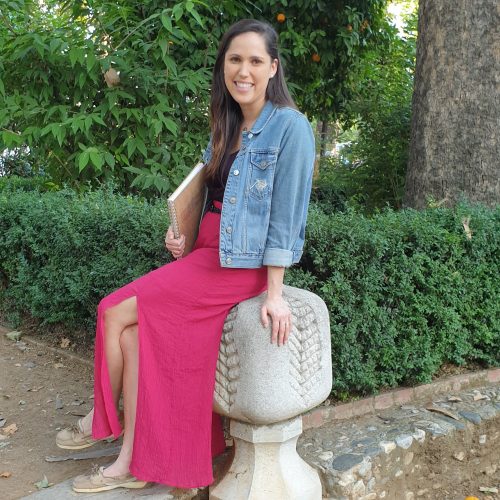
Adapting to a New Culture: Dani’s Experiences
Dear Nora,
Last week we discussed the adaptation process as well as Claudia’s personal experiences but today, Dani will share her answers to the different questions that we discussed in the original post about what you should know. We wanted to share our own, personal experiences to highlight two main points. Firstly, no experience is ever going to be exactly the same as any other experience. Secondly, no matter how many times we have traveled or how well we do in a place or how much we like it, we still live the adaptation process.
Again, these are the answers to the same questions we proposed in this post.
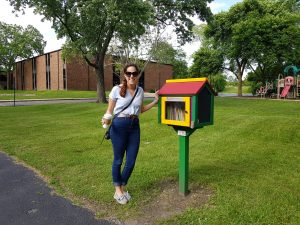 Where are you coming from?
Where are you coming from?
I grew up in suburban, Midwestern USA and, to be quite honest, I didn’t have much of an interest in traveling abroad as a young person. My family was one of those typical American families that traveled primarily within the continental U.S. and so when I moved abroad for my first stint—a study abroad semester in Alicante, Spain to fulfill a requirement for my Hispanic Studies major—I viewed it as “the one and only time I’d visit Europe.”
Upon graduating college in the U.S, I took a job teaching at a public elementary school outside of Granada, Spain through the auxiliares de conversación y cultura (language assistants) program. At this point, I felt that I already had some familiarity with Spain and living abroad in general. Still, I knew things would be different now that I was no longer a student and instead an ‘adult.’
I feel like I was coming from a different place, yet again, when I moved to San José, Costa Rica because I already had had the experience of living abroad and teaching English. When I returned to Spain in 2015, I was coming as someone who was confident that this city abroad was the specific place I wanted to live long-term—all very different mental and emotional ‘start points.’
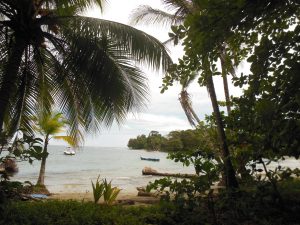 What are your previous experiences?
What are your previous experiences?
When I moved to Alicante to study abroad, I was nineteen years old, quite inexperienced, and more or less running on YOLO vibes.
This mentality was obviously very different from the mentality I had when I returned to Spain two and half years later to be an auxiliar in Granada, Spain. The second time, I already knew I loved Spain, felt experienced in the basics of the language and culture, and I had expectations of making the Andalusian city feel like my home. Still, it was a one-year program and so I did not approach it from a ‘forever’ mentality. Although I didn’t have a return flight from the start, the stay had a definitive end date in my mind.
In the year between being a teaching assistant and moving to Spain indefinitely, I tried my luck teaching in San José, Costa Rica. In this case, I actually feel like my previous experience worked against me. Even though I knew Costa Rica would be entirely different from Spain, on a certain level I think the shared language made me feel that I should be prepared for my experience there and that everything would fall into place more easily for me. I do believe my past experience helped me to be resourceful and resilient in a new environment, but my constant comparison to Spain was what, ultimately, meant I didn’t stay in Costa Rica as long as I originally intended.
When I returned to Spain in 2015, I had the long-term in mind and this made it feel both more comfortable and more intimidating. The adaptation process seemed to present itself in different ways this time than during my previous experiences (as I discuss below).
How are you becoming part of the community?
My shortest time living in one place was when I lived in San José, Costa Rica for about three months. All the same, I feel that I had the ideal situation to become a part of the community quickly, for the reasons listed below.
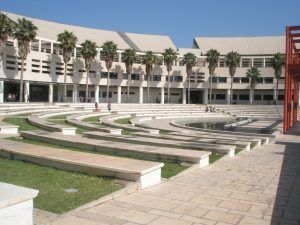 The second shortest time for me was the five months I spent studying abroad in Alicante, Spain. Third would be the school year (9 months) I first taught in Granada. Finally, my longest stint is the one I’m currently on, five years and counting (in Granada again). For the most part, I’d say that the longer I spent, the more integrated into the community I’ve felt but let’s go back to the three ideas discussed in the original post in order to examine that further.
The second shortest time for me was the five months I spent studying abroad in Alicante, Spain. Third would be the school year (9 months) I first taught in Granada. Finally, my longest stint is the one I’m currently on, five years and counting (in Granada again). For the most part, I’d say that the longer I spent, the more integrated into the community I’ve felt but let’s go back to the three ideas discussed in the original post in order to examine that further.
Where you are living?: My living situations have varied a lot over the different cities and years of living abroad. While studying abroad in Alicante, I lived with a host family (in my case, this was just one elderly lady, but the extended family visited often) so this was a relatively immersed experience. At the same time, Alicante is a coastal university city with a lot of international students and so it was easy to hang out with mostly other Americans.
When I first taught in Granada, I lived with flatmates—two Spanish girls and one Australian girl in the same program. This allowed for a medium level of immersion as most conversations within the flat took place in Spanish, but I also had one person to revert into English with if needed. Granada itself is the perfect size city for me, large enough to have plenty to do but small enough to still have that ‘small town’ intimacy.
In Costa Rica, I found a beautiful family to stay with for the first few days through Couchsurfing and we ended up negotiating a set-up for me to stay with them long-term. While the son and daughter (each just a few years younger than me) understood English, we almost never used my native language to communicate. I also spent a fair amount of time with just the mother before I found a teaching job and so I feel like I got to know the local community well through little things like the market, home-cooking, and family routines. At the same time, San José is an industrial city that did not match my hopes for work or social life and I chose to live in a small town a 45-minute commute from the city itself, so I did not necessarily set myself up for an easy adaptation journey.
When I moved back to Granada, I lived for two years in a flat with two Spanish girls and I believe this was the most immersed I was in the student / young people life. Although my experiences in Alicante and San José allowed for insights into family life, the years I spent with my Spanish roommates while they were still at university felt like a more comparable experience to what I might have at their age in Spain. Since then, I have lived for one year on my own and for two years with my English husband. As you can imagine, these two most recent living accommodations (especially during times of COVID) are not so integrated into the community.
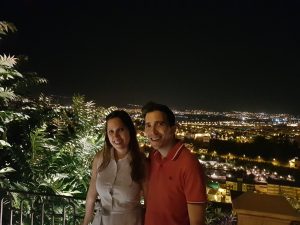 What are you doing there?: The occupation, studies, or other uses of your time really affect your connection to the community as well. As you’ve likely gathered by now, almost all of my experiences involved studying or teaching. In 2020, I’ve transitioned to working as a full-time writer. These activities have led to the following types of interaction.
What are you doing there?: The occupation, studies, or other uses of your time really affect your connection to the community as well. As you’ve likely gathered by now, almost all of my experiences involved studying or teaching. In 2020, I’ve transitioned to working as a full-time writer. These activities have led to the following types of interaction.
Who you are interacting with?: It’s important to note that my study abroad experience was very different from Claudia’s experience. Since I was part of an American program, three out of my five classes that semester were taught by a professor employed by my program, not the university, and all of my classmates in those courses were other Americans. Thankfully, my program gave me the option to enroll directly at the university for two of my classes, but the lecture-based structure didn’t allow for much interaction with my Spanish classmates and I actually ended up only befriending one American girl and one one Italian girl.
Through teaching, I had the opportunity to interact much more intimately with many Spaniards. Still, I would say that the experience is different when you are having it in English (my native language) as opposed to Spanish (the language of the countries I’ve lived). And, of course, there is the unique student-teacher dynamic which is distinct from the dynamic one would have with co-workers.
Outside of my work, I’ve been lucky to find some good friends through events like intercambios. For the most part, these friends have ended up being other foreigners but I have a handful of Spanish friends I’m close with as well. Now more than ever (in the age of social distancing) the person I live with is crucial and my partner is another English-native so, yes, my life is mainly lived in English.
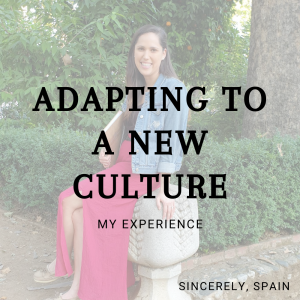 It is an ongoing process
It is an ongoing process
As you can see from the experiences shared above, my adaptation journey has certainly been a process! Different aspects of the process will continue to oscillate as well—shifting from more integrated in some ways and less integrated in others. At a glance, you could say that I’m in a bit of a regression now that I don’t work outside of my home, therefore engaging (almost) exclusively with English-speakers. On one level, this is true. I am not forced to interact with a lot of Spanish language in my daily life.
However, there is more to culture than just the language! My current circumstances have allowed for some beautiful reflection and have shown me what I inherently value from the Spanish culture. There are a number of aspects of the Spanish lifestyle that I have maintained in my life despite “not needing to” because I no longer live with or work with Spaniards. In this way, I feel like I’ve reached a part of the adaptation process in which I am not blindly trying to do everything “the Spanish way” to fit in (a tactic that works relatively well during short-term living abroad) but instead actively integrating what I love about Spanish culture into who I want to be (a tactic that feels much more feasible in the long-term).
For example, my husband and I approach our day from a Spanish timetable. I cook along the lines of the Mediterranean diet far more than an ‘American’ or ‘English’ diet. We both take time out of our week to engage with Spanish through virtual classes, podcasts, and TV shows, but we are not pushing ourselves to attend large events (which, at this point in time, don’t feel safe to us) in order to meet new people or appease all of our Spanish friends. Read more about fitting in vs. staying true to yourself here.
Living abroad during a pandemic has been a completely new phase of the adaptation journey and I feel like it has tested so much of what I learned before now. Still, despite the unprecedented, confusing times we’ve been living in, I never deeply questioned if I was in the right place for this moment in my life and that has been a profound, unprecedented stage of my process, too.
Five years into this stay in Granada and nearly ten years after my first move abroad, I’m still learning new things and adapting in new ways everyday. I hope that by sharing our experiences you will find comfort in the fact that this never-ending process is not only normal, it’s beautiful!
Sincerely,
Dani


